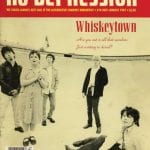Sunshine Club – Sorry, no KC here
It’s a rainy winter night in San Francisco, but all is warm and well inside the Hotel Utah. The long, narrow room spills forth with spirits — both distilled and historical, a sense of decades-old legend and lore looming unspoken within these walls.
Tucked away in the back of a small nook at the far end of the bar, visible only from a small sunken floor area and an even smaller balcony above it, is a modest stage, upon which the four members of the Sunshine Club have set up shop for a show with fellow Bay Area band Tarnation. Soon the spirits are taking sonic form as well, drifting on the wings of the Sunshine Club’s alluring, ethereal music and singer Denise Bon Giovanni’s subtly enchanting voice.
For the moment, you’ll probably have to travel to the Utah, or some other San Francisco club, to catch this promising young band. A record deal that would justify nationwide touring has so far eluded the group, even though their self-released debut album Visit to a Small Planet was one of last year’s hidden treasures.
At times reminiscent of the Cowboy Junkies, the Sunshine Club ultimately emerges as more inventive and, at times, more intense than that Canadian ensemble — not to mention less overtly country, though the band members’ previous experience in Bay Area country-tinged bands such as the Doubters, Farm Girl and the Old Joe Clarks clearly has influenced the Sunshine Club’s sound.
“I think Denise’s writing comes back to that atmosphere — that same high lonesome desolation of a Hank Williams song — but it’s in different genres,” suggests guitarist Sean Coleman, whose swirling, sometimes psychedelic playing helps to send the group’s music in other directions. “Sometimes we’ll get pegged with the Americana/roots category; one of the Bammies [Bay Area Music Awards] we’re nominated for is Americana/roots. And at the same time we’ll get airplay on the alternative station. I don’t think people really know where to slot us.”
Which is ultimately a good thing musically, even if it presents a commercial obstacle. Though the band sold out of its initial pressing of 1,100 copies of Visit to a Small Planet , the next step up the career ladder has proven a challenge. “We’ve been talking to different labels, and getting the impression that something’s going to happen real quick, and of course it doesn’t,” said drummer Paul Comaskey. “So we’ve spent a few months waiting to see what we’ll do next.”
Comaskey, who along with bassist Simon Colley is originally from England, moved to New York in the mid-’80s and for a brief time played in a band called the Nervous Kind with guitarist Mark Spencer in Spencer’s pre-Blood Oranges days. After moving west, Comaskey hooked up with the Doubters, Richard Buckner’s backing band in the early ’90s. Eventually he met Coleman and Bon Giovanni, who had already begun collaborating; Comaskey subsequently brought his old pal Colley into the fold.
For Bon Giovanni, who writes most of the songs, the Sunshine Club was a welcome opportunity to have more musical input after playing supplemental roles in a punk band called Thursday’s Child and the country/folk-oriented Old Joe Clarks. “I never really liked punk, actually,” she confesses in regard to her tenure with Thursday’s Child. “I went in thinking that I was going to get to do something more like what I wanted to do, but I was one of the least dominant personalities in the band.”
Her next outing was a better fit, and “at the time, I was pretty content with just having a supporting role in the Old Joe Clarks,” she said. “And then I met Sean, and we just started jamming, and it clicked. There was an inspiration there; suddenly I was inspired to write.”
Bon Giovanni’s writing is one of the things that makes Visit to a Small Planet special. Lyrically, her songs are usually rather oblique; they fit the mood of the song, but it’s ultimately the melodies that carry most of the weight. As such, the album’s one cover song — Burt Bacharach’s “The Look Of Love” — is an ideal choice for the band.
“A lot of times with Burt Bacharach stuff, the music is so great that you kind of forget whatever the lyrics are,” Coleman says. “So you just get that music, and it can be sung by anybody in any arrangement, and it’s just great.”




